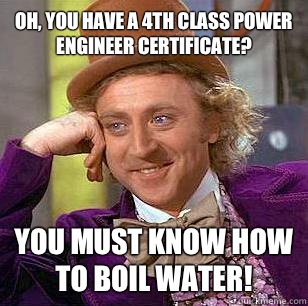
What an employer may really think of a recent power engineering graduate.
Executive and long-time members of the B.C. Institute of Power Engineers spoke to first-year BCIT power engineering students on Monday about the importance of forming networks and starting their job hunts early. Student attendance and interest was pretty good as we had people spilling out of the room and into the hallways.
I was fortunate to be invited to do a presentation on the BC IPE student website (click here if you want to check it out). Keeping with the theme of the presentation, I threw in a few stories and tips for networking as well as dispel a few power engineering myths.
Here’s what I, and others, tried to get across at the meeting
Everyone is aiming for the oil sands
I don’t think anyone of us where surprised that most of the first year students already have the dream of making $100K-plus per year and that a comfy job in the oil industry awaited them after graduation. While jobs like that do exist, we made it clear that those jobs are not served on a silver platter.
The really well-paying jobs go to the power engineers with experience and who have “paid their dues.” The fact is an employer will tend to hire someone with a few years (or more) of proven boiler experience over a green-horn coming out of school.
In my opinion, a fresh power engineering graduate will not have a fighting chance in a job competition over a power engineer who already has oil and gas experience. The same can be said for a student who wants to jump straight into power generation. I’ve seen candidates crossed off the short list for lack of industrial experience; the employer would rather hold the job open for when a better candidate applies.
Competition is fierce for these positions as well. A power engineering graduate will be competing against graduates from their own class as well as other schools in Canada.
Sorry people, but your dream job may require a nightmare’s worth of experience to get.
It’s not what you know but who you know
Networking is essential in power engineering. Most people get hired for a job through the recommendations of their peers who know certain people in the industry. This is especially true of the Lower Mainland in British Columbia where power engineering families have known each other for generations.
Getting a job usually depends on who will vouch for you. The chances of getting a foot in the door increase if you know someone already working in the company you apply to. Instructors are a good way to find a job as well.
I made it a point of telling the first year students that the BCIT power engineering program is actually a one- or two-year interview. Instructors do make note of who will be a good match for certain companies and they are asked by chief engineers for recommendations. That’s something to think about if you decide to text or sleep during a lecture.
It is essential to start networking early and professionally. This goes for every industry, not just power engineering.
What sets you apart from the rest of the pack?
Everyone will be graduating with a fourth- or third-class power engineering certificate. So what sets a person apart from the rest of the pack?
We stressed the advantages of having additional skills that compliment a power engineering certificate (such as pipe and steam fitting). An employer is always trying to get the most bang for their buck and a candidate with extra qualifications will get more attention.
For me, a bachelors degree in journalism signaled to prospective companies that I have good writing and communication skills (as well as not having to hire a technical writer for creating future procedures and manuals). My criminology background also meant that I was no stranger to contract and administrative law. Additional education can give you an edge over your competition.
And finally, have an effective resume and cover letter
I do not believe much has to be said for this. A shoddy resume and cover letter is the best way NOT to get an interview. It is worth the time to have someone well-versed in pagination (the skill of formatting a page) and proofreading to go over your resume and make suggestions.
